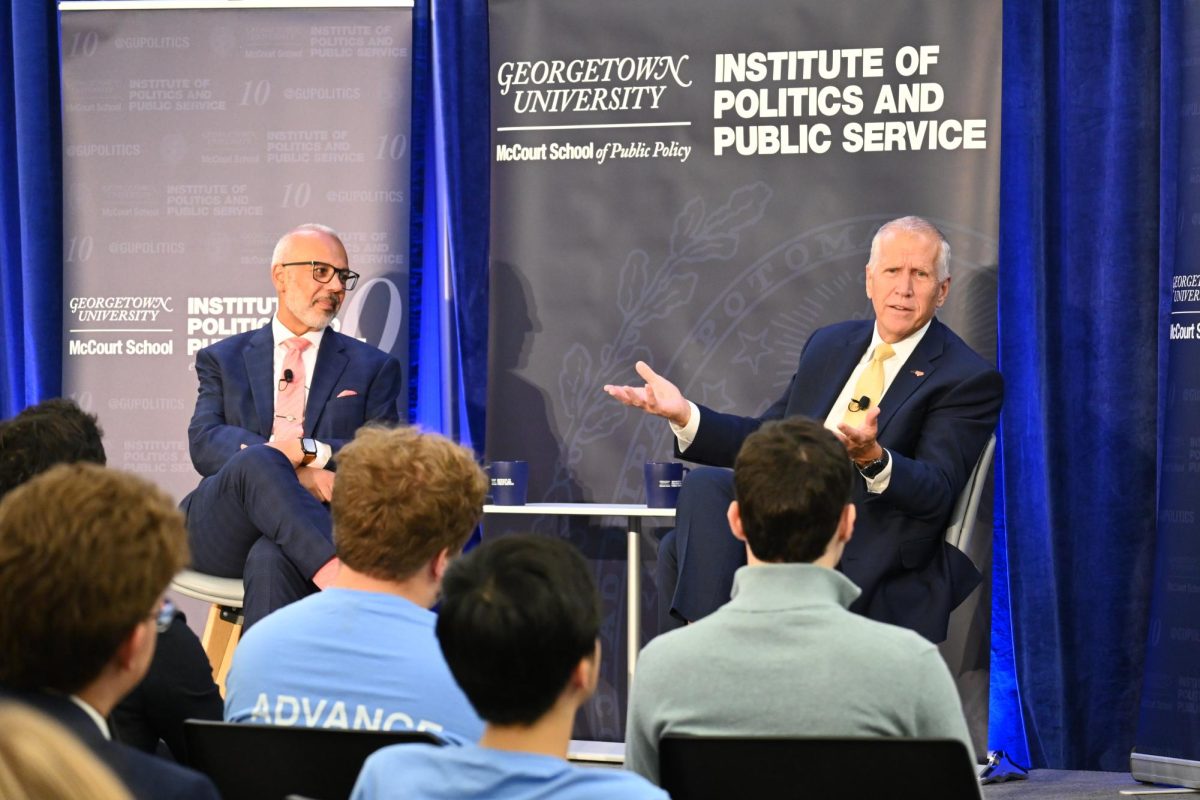Former Sen. Rob Portman (R-Ohio) argued globalized free trade creates broad benefits but harms some U.S. workers amid President Donald Trump’s increasing tariff policy during an event at Georgetown University’s McCourt School of Public Policy on Sept. 16.
Portman, who served as the U.S. trade representative from 2005 to 2006, praised targeted trade deals but warned that Trump has seized unjustified emergency powers to circumvent congressional approval with his tariff policy. Ana Swanson, a trade and international economics reporter for The New York Times, moderated the event, which was sponsored by the Georgetown University Law Center’s Institute of International Economic Law.

(American Enterprise Institute)
Portman said that though international trade is a net positive for the United States, politicians must speak to communities feeling left behind, especially those working in sectors that have moved overseas, such as manufacturing.
“Trade has a lot of benefits in a broad context, but it also has negative impacts that are felt more acutely within a community,” Portman said at the event. “The workers in Ohio I’ve represented in the House and the Senate are generally skeptical because they figure they’re not getting a fair shake. And, in many cases, they’re right.”
“You have to make the argument for it, and make it effective,” Portman added.
Portman represented Ohio’s second congressional district from 1993 to 2005, resigning partway through his final term when he was appointed U.S. Trade Representative by President George W. Bush. He was elected senator in 2010, besting his Democratic opponent by 17.5 points. After winning reelection in 2016, he declined to seek a third term, retiring in 2023.
Portman offered praise for Trump’s trade negotiations with other countries and said the government is working hard to negotiate deals that will benefit the United States.
“I think it’s been pretty effective,” Portman said. “You can look at it in different ways, I suppose, but we’ve worked on agreements with the E.U. and Japan and Korea and the U.K., and we’re hoping to get something together with China.”
The Trump administration invoked the International Emergency Economic Powers (IEEPA) to impose tariffs on many countries, using the emergency law that sidesteps Congress’s authority. To justify his orders, Trump has cited a need for economic autonomy and for a solution to the ongoing fentanyl crisis along U.S. borders.
Portman said he sees the lack of retaliation from other countries in response to the tariffs as evidence that the administration’s strategy has been successful.
“Not a single country has retaliated, which has surprised me,” Portman said. “But I think a lot of it is because they do want to be working with us and with our market.”
Portman said that while the fentanyl-based tariffs, which target Canada, Mexico and China, could constitute a national emergency in the eyes of the courts, the trade deficit reciprocal tariffs do not.
“Tariffs based on fentanyl could be a national emergency,” Portman said. “A lot of the other tariffs do not qualify. If they’re reciprocal tariffs in place because we have had a trade deficit for decades, that’s probably not an emergency.”
The U.S. effective tariff rate, the average duty levied against all foreign goods, stood at 15.8% in August, down from a 22% high in April but up significantly from 2.3% at the end of 2024.
Despite changes in American policy, Portman said globalization remains strong, with new free trade deals between countries replacing those nations’ prior agreements with the United States.
“Increased trade is occurring in Southeast Asia, amongst countries that we consider developing,” Portman said. “They’re on the move.”
Portman said global trade remains a strong force despite the Trump administration’s recent actions.
“People ask if globalization is dead, I paraphrase Mark Twain: ‘The death of globalization is greatly exaggerated,’” Portman said.













